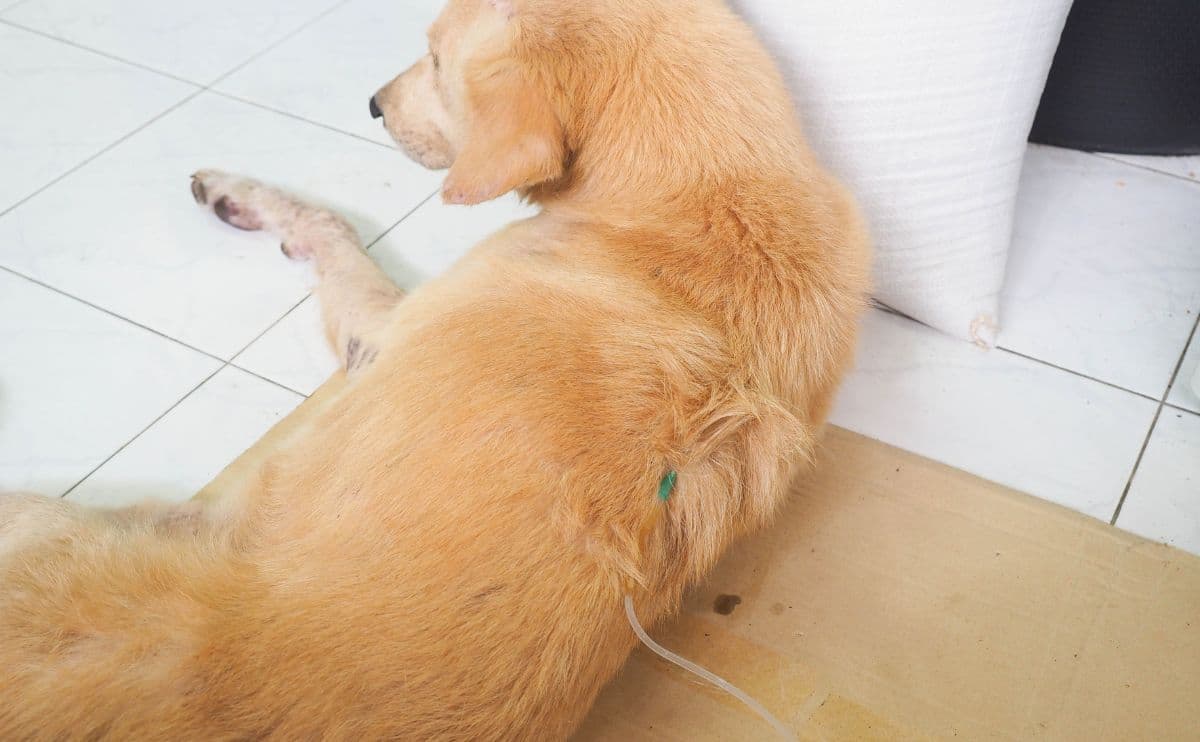When you purchase through links on our site, we may earn a commission. Here’s how it works.
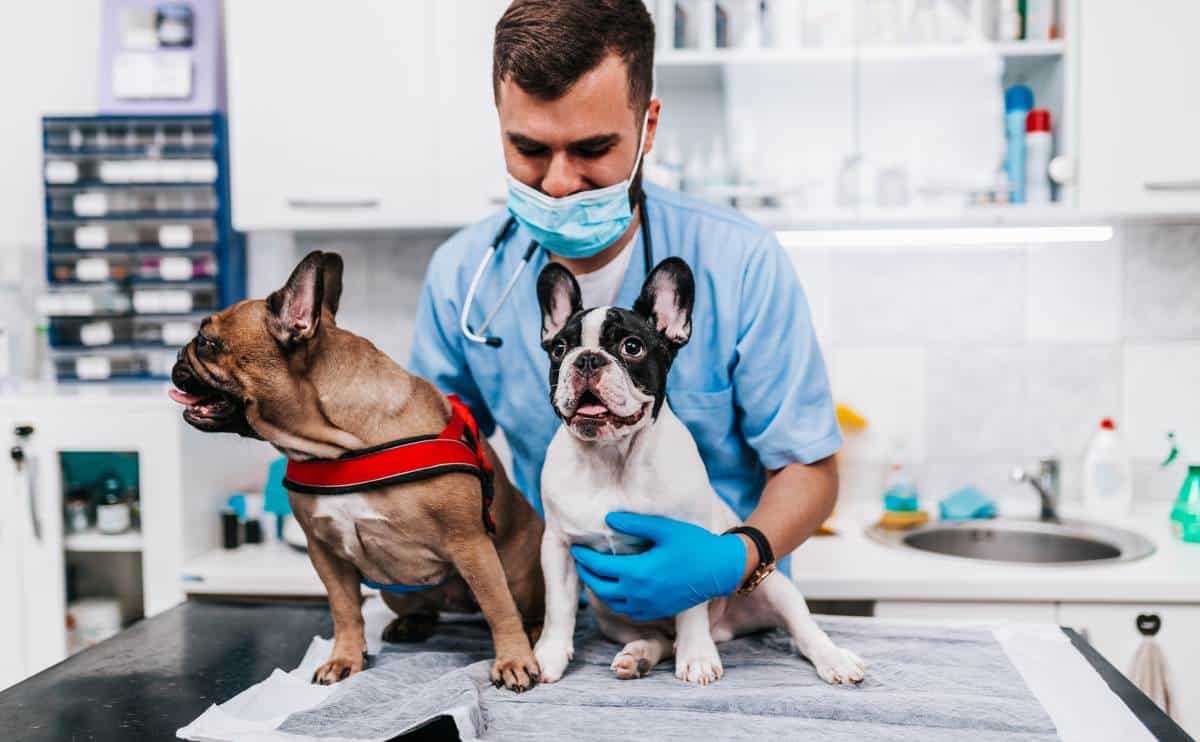
French Bulldogs top the AKC list of the most popular dog breeds in the U.S., and for many good reasons. Who can resist those adorable bat ears and smushy faces? These spunky, fun-loving little pups are full of affection and loyalty for their family members. If you’re considering adopting a Frenchie, you may be wondering, are French Bulldogs healthy? Or do French Bulldogs have health issues?
Unfortunately, Frenchies are predisposed to an extraordinarily high number of health issues compared to many dog breeds. These medical problems can end up costing you thousands of dollars in veterinary bills — and potential heartache dealing with an unhealthy furry friend. If you already own a Frenchie, keep in mind that early diagnosis is key for many health issues.
I’ll share the most common ones that affect Frenchies along with symptoms to watch for so you can get veterinary care as early as possible. If you’re considering adopting a Frenchie, all of my information can also help you understand the potential problems you may face.
12 French Bulldog Common Health Issues
A recent study by the Royal Veterinary College of more than 2,000 French Bulldogs found that over 72% had at least one health disorder. The data also showed that Frenchies had “significantly increased” odds of being diagnosed with 20 common conditions compared to other dog breeds. Here’s a top 10 list of the most common health issues that affect this breed. It’s so important to familiarize yourself with the symptoms so you can contact your vet as soon as you spot signs.
1. Brachycephalic Obstructive Airway Syndrome (BOAS)
“The most common problem I see with French Bulldogs in my practice is brachycephalic obstructive airway syndrome (BOAS), says Dr. Rebecca MacMillan, a companion animal veterinarian in Gloucester, United Kingdom. “Many Frenchies have breathing issues to varying degrees. These are caused by their narrowed, slit-like nostrils, flattened faces, elongated soft palates, and narrowed tracheas (windpipe).”
All brachycephalic breeds (flat-faced breeds like Frenchies, Pugs, Boston Terriers, etc.) have some form of genetically inherited BOAS, and breathing problems can range anywhere from mild to severe. Unfortunately, 50% of French Bulldogs have “clinically significant signs” of BOAS, according to the Humane Society Veterinary Medical Association.
Symptoms
Dogs with brachycephalic syndrome can exhibit the following symptoms, which can range from mild to debilitating.
- Noisy breathing
- Snuffling
- Snoring when sleeping or relaxed
- Coughing and raspiness
- Reverse sneezing
- Exercise intolerance (snorting with exercise)
- Heat intolerance
- Gagging and retching
It’s important to have your vet check your Frenchie every one or two years for significant signs of BOAS, as this condition can progress during his lifetime and even shorten his life. In serious cases, surgery can help improve airflow. Milder cases are usually managed with weight control, limited exercise, and avoiding stress and hot temperatures.
2. Heat Stroke
French Bulldogs are particularly prone to heat stroke because of BOAS. Even in mild cases, Frenchies can overheat quite easily. Dogs don’t sweat the same way humans do; they use panting as the primary way to cool down. On top of BOAS, their flat faces make it difficult for this breed to pant. So, you should avoid hot weather and minimize exercise.
Symptoms
- Excessive panting
- Rapid breathing
- Dry, sticky gums
- Lethargy
- Seizures
- Vomiting and diarrhea
- Collapse
- Loss of consciousness
- Disorientation and confusion
If your pup is panting excessively, take him to a cool area and give him plenty of water. You can also try to cool him down by giving him a cool bath, hosing him down, or placing a cold towel or bag of frozen veggies on his head. If you believe that your dog is suffering from a heat stroke, you must treat it as a medical emergency and immediately seek help. Your vet will administer intravenous (IV) fluids and oxygen therapy and continuously monitor your dog’s body temperature during treatment.
3. Skin Problems
Sure, part of what makes Frenchies so adorable is their wrinkly, scrunched-up skin. While aesthetically endearing, their skin and tail folds are, unfortunately, breeding grounds for bacteria and fungi to thrive. This can lead to frequent bouts of skin fold dermatitis and other skin infections. However, regularly cleaning your pup’s skin and tail folds can go a long way to preventing infections from developing.
“Skin allergies are also extremely common in this breed,” shares Dr. MacMillan. “I regularly see Frenchies for this problem. If your dog licks his paws frequently, scratches excessively, or has sore ears or patches of skin, then you must seek veterinary help for this.”
What causes allergies in Frenchies? This breed is genetically predisposed to atopic dermatitis, which is caused by inhaling or having direct skin contact with environmental allergens (pollen, dust mites, grass, mold spores, etc.). Frenchies are also at a higher risk for food intolerances and allergies. Unlike humans, dog allergy symptoms typically present as skin problems.
Allergy Symptoms
- Excessive scratching, licking, or chewing
- Red and inflamed skin
- Papules or pustules (pus-filled lesions on the skin that resemble human pimples)
- Dry or flaky patches of skin
- Patchy fur loss
- Itchy ears
- Swollen face and paws
It’s often tricky to figure out what’s causing your pup’s allergies, so consulting your veterinarian is the best course of action. Your vet can help determine possible causes through a systematic process of elimination and may even want to conduct allergy tests. Treatment options vary based on the cause, but testing and potential lifelong treatment, including allergy medications or prescription dog food, can get quite expensive.
Consider An At-Home Dog Allergy Test
4. Ear Infections
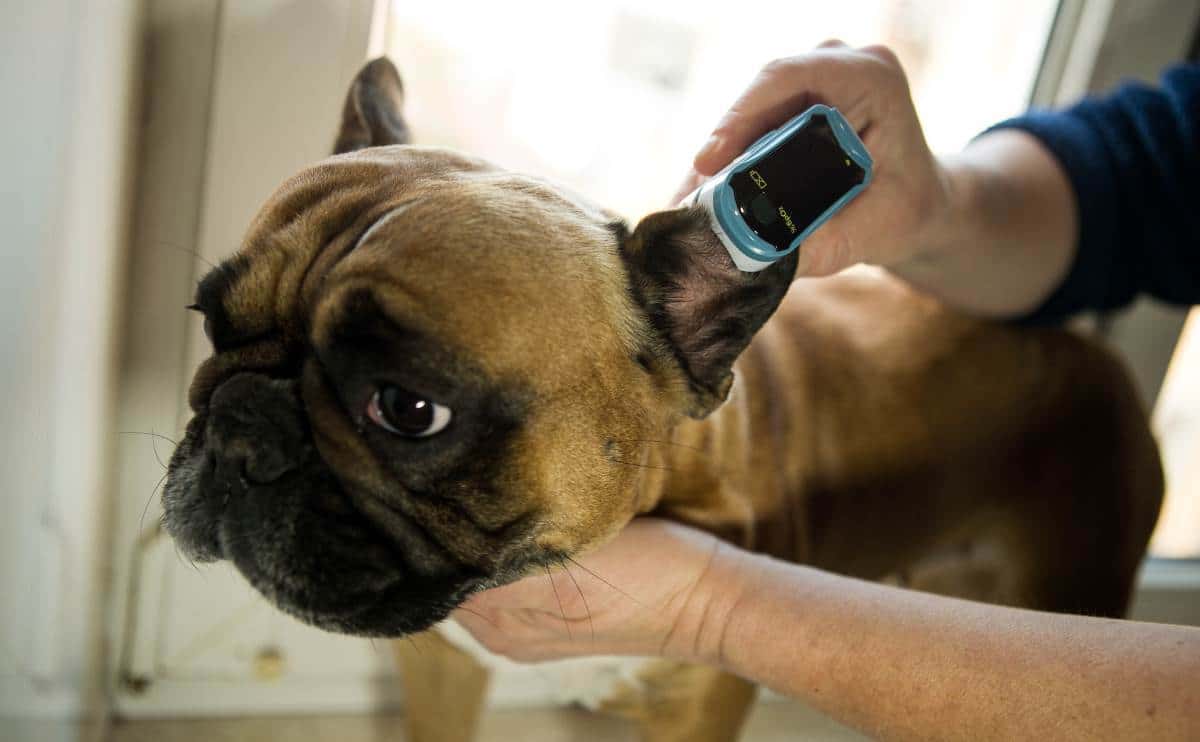
Oh, those ridiculously cute bat-like ears. It’s yet again another irresistible feature that isn’t always ideal for this breed’s health. Unfortunately, Frenchies face a double whammy when it comes to the propensity for ear infections. First, the shape of their ear canal is narrower than many other breeds, so dirt and debris can easily become lodged in the canal, causing infection of the outer ear canal (otitis externa).
It also doesn’t help that their ears have wide openings, making it much easier for debris and germs to get into their ear canals. Another problem for many Frenchies — allergies often cause ear infections. The best thing you can do to prevent ear infections is regularly clean your little guy’s ears.
Symptoms
- Head shaking
- Scratching ear or areas around the ears
- Rubbing ear on the floor or furniture
- Redness or swelling
- Ear odor
- Yellow, brown, or bloody discharge
- Fur loss around the ear
- Scabs or crusted skin near the ear flaps
Fortunately, occasional minor ear infections are easily treatable with proper vet care. However, chronic ear infections can cause changes to the shape of the ear canal (making it even narrower). Chronic otitis externa can also lead to more serious infections of the middle and inner ear.
5. Chronic Diarrhea
French Bulldogs are genetically prone to several gastrointestinal (GI) issues that result in chronic diarrhea. The most common cause is food allergies, but often inflammatory bowel disease (IBD) is to blame. Frenchies also have a risk of developing a severe, breed-specific form of IBD called Granulomatous colitis (GC). Signs of GC include bloody diarrhea, weight loss, anemia, and debilitation.
While antibiotics can cause GC to go into remission, treatment for allergies and other forms of IBD is often lifelong, involving medication and/or prescription diets.
6. Hip Dysplasia
Yet another genetically inherited issue in French Bulldogs, hip dysplasia is a chronic condition that causes the head of the femur bone to meet with the hip socket incorrectly. Canine hip dysplasia often leads to degenerative joint diseases like arthritis.
Symptoms
- Pain or discomfort during exercise
- Lameness
- Stiff back legs
- “Bunny hop” like run
- Stiffness getting up or running
- Difficulty getting up
- Muscle tone loss in back legs
- Lack of enjoyment with physical activities that were previously enjoyable
Treatment consists of your vet taking an x-ray of the dog’s hip sockets and deciding a course of treatment. In severe cases, dogs may need surgery. Other treatment methods include medications to treat inflammation, joint supplements, weight management, and physical therapy.
7. Patella Luxation
Patella luxation is another hereditary joint problem found in French Bulldogs. A luxating patella occurs when the patella, or kneecap, sporadically shifts and dislocates outside of its normal location. It occurs in the hind legs but not the front legs. In half of all cases, it affects both hind knees.
Symptoms
Most dogs start showing signs between four and six months of age. When the kneecap dislocates, you may notice your dog:
- Hopping on his hind leg
- Holding his leg up
- Running on three legs
- Stretching the leg out to try to pop the kneecap back in place
Once the kneecap pops back in place, dogs walk normally again on all four legs. In most cases, this disease progresses over time, causing more frequent dislocations, cartilage damage, structural wear and tear, and arthritis. This condition is graded from 1 to 4 (mild to severe), with the latter perhaps requiring surgery. Dogs with grades III and IV require surgery, and it’s often recommended for grade II as well.
8. Intervertebral Disc Disease (IVDD)
With intervertebral disc disease (IVDD), the cushioning discs between the spinal column bones (vertebrae) deteriorate or become damaged and move or bulge into the spinal canal, causing pain and nerve damage. One large study found that French Bulldogs were among the top five breeds with the highest rates of IVDD. It’s believed that the combination of this breed’s weight coupled with short legs is the primary cause of disc degeneration that leads to IVDD.
Symptoms
These signs can occur slowly (over several weeks to months) or rapidly (over minutes to hours). Most dogs develop signs over a few days.
- Abnormal, unsteady walking
- Hunched back or neck with tense muscles
- Crying out in pain
- Loss of bladder or bowel control
- Paralysis
Treatment depends on the severity of the disease and typically involves medication to control pain and swelling, as well as strict exercise restrictions. In more severe cases, surgery is required to prevent paralysis.
10. Multiple Eye Problems
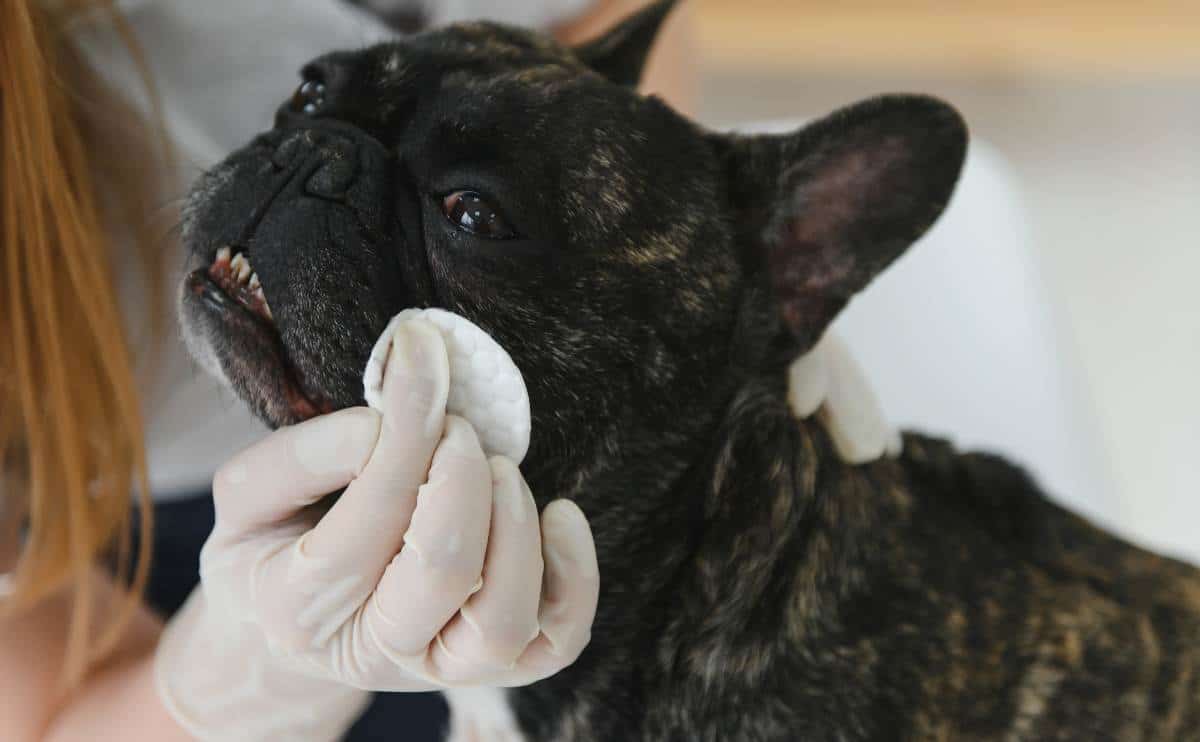
The adorably bulgy eyes of Frenchies are another of this breed’s endearing physical features. The bad news is that these buggy eyes suffer from an inordinate amount of ocular health problems due to genetics. Also, because their eyes protrude, they’re more prone to injury and infections. Here are some common Frenchie eye problems. Some of these conditions can be present at the same time.
- Chronic dry eye or Keratoconjunctivitis sicca (KCS): a chronic condition that causes the inflammation of the cornea due to a lack of tear production. Treatment typically is the regular use of vet-prescribed tear-stimulating drops.
- Cherry eye: often a recurring problem, cherry eye occurs when the tear gland of a dog’s third eyelid prolapses and protrudes from the eye socket. You’ll notice a large, pink or red mass in the corner of your pup’s eye. In most cases, surgery is recommended to keep the gland in place.
- Entropion: a hereditary condition, entropion involves the inward rolling of the top and/or bottom eyelids. This causes the eyelashes to rub against the cornea, resulting in chronic irritation and corneal ulcers. Treatment requires surgery.
- Corneal ulcers: a serious and painful condition, corneal ulcers are open wounds on the cornea. They can occur from injury, infection, or secondary to many of the eye problems listed above. Treatment typically involves topical antibiotics, anti-inflammatories, and pain meds; however, deep wounds may require minor surgery.
- Cataracts: A common condition in many dogs (and humans), cataracts occur when the lens becomes firmer and less transparent. As the cataract matures, it blocks more and more light from reaching the back of the eye until vision is lost. Treatment requires surgery.
Symptoms
Unless noted above, many eye problems share similar symptoms.
- Eye sensitivity
- Squinty eyes
- Repeated blinking
- Bloodshot or cloudy eyes
- Yellow or green discharge
11. Brain Tumors
Frenchies are at a high risk of developing brain tumors, even at younger ages. A study published in 2015 found that French Bulldogs are among the top four breeds with a heightened risk of developing glioma, the most common form of malignant primary brain tumors in dogs (and humans). Frenchies’ short snouts make them more likely to develop glial cell tumors, as well as pituitary tumors.
Symptoms
Brain tumor signs can differ depending on where the mass is located in the brain, but here are some signs to watch out for.
- Seizures
- Abnormal behavior or temperament
- Vision problems
- Unsteady gait
- Walking in circles
- Lack of appetite or thirst
X-rays can’t detect brain tumors, so the most accurate way to detect them is with magnetic resonance imaging (MRI) or computed tomography (CT) scans. Treatment options may include surgical removal, stereotactic radiosurgery (SRS), radiation therapy, chemotherapy, and palliative care.
12. Dental Problems
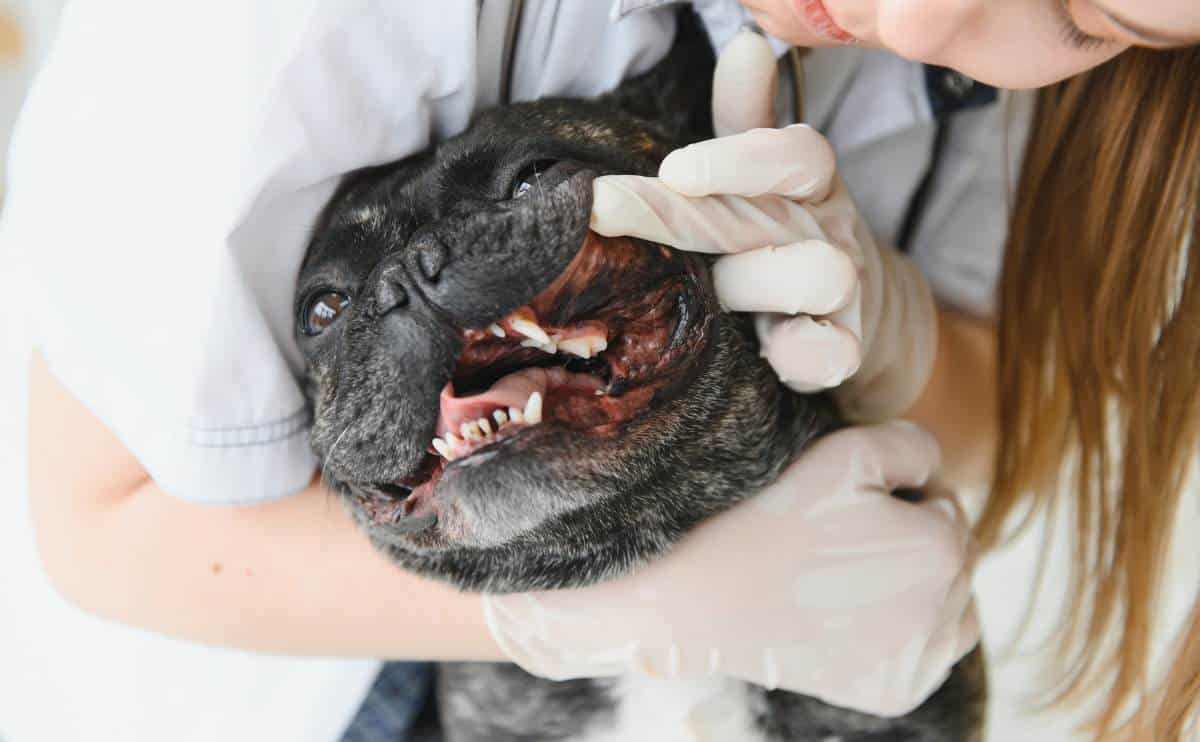
Frenchies and other brachycephalic breeds are particularly predisposed to dental disease. All dogs have 42 permanent adult teeth, but for French Bulldogs and other breeds who have small mouths and shortened jaws, all of these teeth don’t fit well together, causing teeth overcrowding. This overcrowding can easily cause increased tartar buildup, which leads to dental disease in the gums and, eventually, the dental bones.
Symptoms
- Bad breath
- Brown or yellow teeth
- Loose teeth or tooth loss
- Plaque and tartar buildup
- Red and bleeding gums
- Swollen gums
- Trouble eating
Treatment depends on the stage of gum disease. In the early stages, a regular dental cleaning or deep cleaning may help minimize disease progression. More advanced gum disease may require deep cleaning and tooth extractions.
Average Costs For Several Frenchie Health Issues
Fetch Pet Insurance says of its insured French Bulldogs that allergies, eye inflammation, and respiratory infections are common illnesses they cover. As reported by Fetch, the range of average costs for these health problems are:
- Allergies: $1,400 to $2,600
- Eye inflammation: $475 to $850
- Respiratory infections: $1,425 to $2,600
Embrace Pet Insurance lists hip dysplasia, IVDD, and entropion as common health issues this provider sees in insured Frenchies, with the following average costs based on claims.
- IVDD: $2,500-$7,000
- Hip dysplasia: $1,500-$6,000
- Entropion: $300-$1,500
How Pet Insurance Can Help
Fetch Customer Testimonial For French Bulldog Medical Care
Fetch has been with me since the day I adopted my French Bulldog in 2019. Basically a four-pound potato, my little pup stole my heart from the start, and I was sure to insure him shortly after I took him home. We’ve been through unexpected dental surgeries, poison ingestion, countless allergy visits, and emergency x-rays and Fetch has been with us through it all. Their claims process is simple, their coverage is unbeatable, and their reimbursement process is quick. We are so grateful for Fetch. They’re basically the best fairy godparents a Frenchie (and his mom) could ask for.
– Ashley A.
Frequently Asked Questions
Here are some questions our readers ask most often about French Bulldog health problems. Don’t see yours here? Ask us in our comments.
What do French Bulldogs usually die from?
A study of Frenchies in the U.K. by the Royal Veterinary College reported that the leading causes of death were brain disorders, such as brain tumors, and spinal cord disorders, like IVDD. Other common causes of death included respiratory complications and cancer.
What is the life expectancy of a French Bulldog?
The average life expectancy of a French Bulldog is 10 to 12 years. However, several factors impact every pup’s lifespan, including genetics, overall health, and lifestyle.
Why are Frenchies predisposed to so many health issues?
Decades of selective breeding for aesthetic features have contributed to the multiple health problems that French Bulldogs and several other brachycephalic breeds face. Because of the soaring popularity of this breed for its appearance, breeders haven’t properly weeded out many of the hereditary issues Frenchies can inherit.
However, this problem is gaining more attention. In the U.S., the French Bulldog Club of America has partnered with the Canine Health Information Center (CHIC). The CHIC researches and maintains information on the health issues prevalent in specific breeds and has established a recommended protocol for breed-specific health screenings. For Frenchies, these currently include hip, eye, patella, and cardiac (heart) screenings.
What’s The Best Diet For French Bulldogs?
Because Frenchies are prone to so many health issues, feeding them the healthiest diet possible can help keep symptoms at bay and boost their immune systems to fight off their risk for infections. See our top picks for the best dog food for French Bulldogs in all life stages. You may also want to check out our reviews of the best dog food for allergies and the best dog food for sensitive stomachs if these are health issues your pup faces.
Tagged With:

